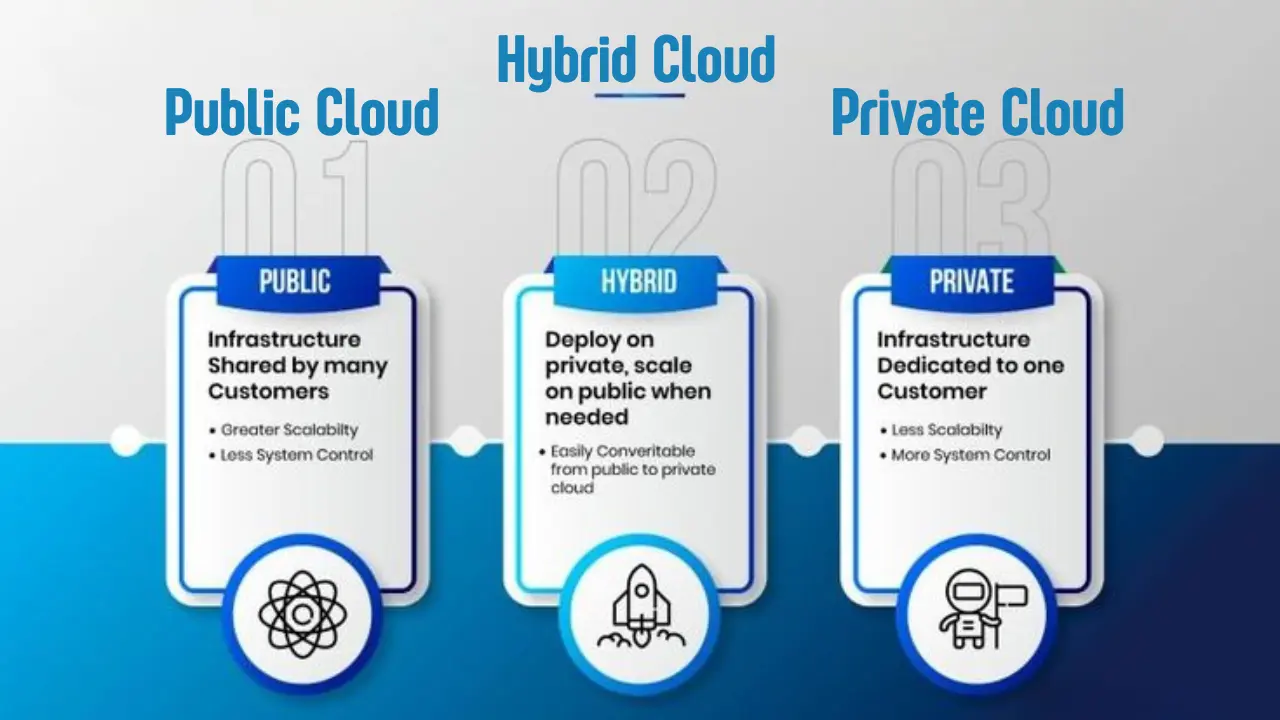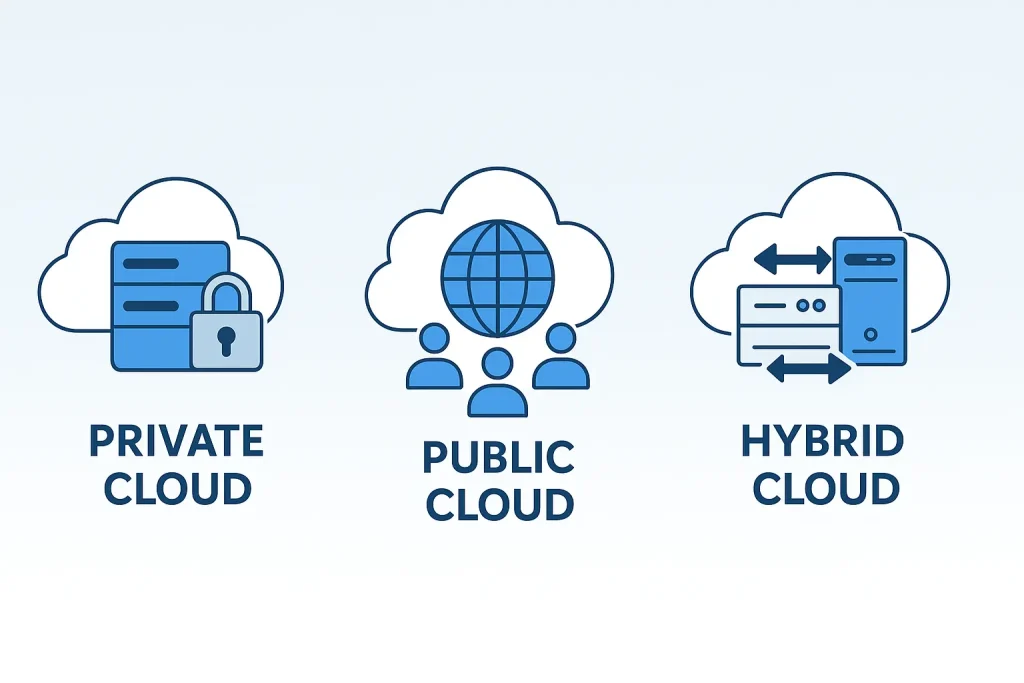
Understanding the Cloud: Public, Private and Hybrid
Basically, cloud computing in simple terms is the delivery of computing services like servers, storage, networking, analytics and databases over the Internet. An enterprise can now access IT resources on demand using the resources of a cloud provider, instead of having to own physical infrastructure.
In Kenya, as well as the wider East African region, cloud computing is significantly changing the way in which companies do business, particularly within sectors such as finance, e-commerce, education, agriculture and government.
With the increase of internet usage and mobile penetration, cloud computing has become a key driver in overall growth in the region. For businesses looking to advance their operations, reduce IT costs and be able to scale more effectively, knowing the Different Types of Cloud Computing Models: Public, Private and Hybrid is important.
Types of Cloud Computing Explained

1. Public Cloud
A public cloud is a cloud computing model where services are delivered over the public internet and shared across multiple organizations. These services are provided by cloud service providers like Angani.
Public cloud providers own and maintain the infrastructure, software and hardware, allowing businesses in Kenya and East Africa to pay only for what they use. This model is ideal for startups, small businesses and non-profit organizations that want to avoid large upfront investments in IT infrastructure.
Benefits of Public Cloud:
- Scalability: Resources can be increased or decreased based on business needs.
- Cost-Effectiveness: No capital expenses. Pay-as-you-go pricing.
- Quick Deployment: Businesses can deploy applications and services rapidly.
- Global Reach: Access to services from anywhere with an internet connection.
Use Cases in East Africa:
- Hosting e-commerce platforms
- Online education and learning management systems
- Government digital service portals
2. Private Cloud
A private cloud refers to a computing environment dedicated solely to one organization. It offers the same scalability and performance as the public cloud but is hosted either on-premises or by a third-party provider.
For businesses in regulated industries like finance, healthcare or telecommunications, a private cloud provides greater control, customization and security over their IT environment. In Kenya, enterprises and institutions looking to meet data residency requirements often prefer private cloud setups.
Benefits of Private Cloud:
- Enhanced Security: Sensitive data remains behind organizational firewalls.
- Customizable: Infrastructure and software can be tailored to business needs.
- Compliance: Meets stringent regulatory and governance requirements.
- Performance: Resources are not shared with other organizations.
Ideal for:
- Banks and SACCOs
- Government agencies
- Healthcare providers
- Research institutions
3. Hybrid Cloud
A hybrid cloud combines both public and private cloud environments, allowing data and applications to be shared between them. It provides flexibility by enabling workloads to move between clouds as computing needs and costs change.
This model is increasingly popular in Kenya and East Africa as it allows businesses to maintain control over sensitive data while leveraging the scalability and efficiency of public cloud services for less critical workloads.
Reach out to Angani if you are looking for a hybrid cloud solution that provides flexibility and control.
Benefits of Hybrid Cloud:
- Flexibility: Businesses can balance workloads between private and public infrastructure.
- Business Continuity: Supports backup, disaster recovery and failover strategies.
- Optimized Costs: High-priority tasks can remain on private servers; others on public.
- Compliance and Innovation: Stay compliant while accessing modern cloud tools.
Best for:
- Large enterprises with existing IT infrastructure
- Educational institutions with sensitive student records
- Media companies managing both secure content and public engagement
Key Differences between Public, Private and Hybrid Cloud
| Feature | Public Cloud | Private Cloud | Hybrid Cloud |
|---|---|---|---|
| Ownership | Third-party provider | Single organization | Mix of both |
| Cost | Pay-per-use | Capital and operating costs | Mixed |
| Security | Standard encryption | Enhanced security | Controlled + cloud security mix |
| Scalability | High | Moderate to high | Very high |
| Customization | Limited | Highly customizable | Custom + on-demand |
| Deployment Time | Fast | Moderate | Depends on setup |
| Compliance | May require adjustments | Easier to comply | Flexibly compliant |
Choosing the Right Cloud Model in Kenya & East Africa
When deciding between public, private or hybrid cloud, businesses should consider several factors:
- Budget: What is the organization’s IT spending capacity?
- Compliance: Are there regulatory requirements for data handling?
- Security Needs: Is the data sensitive or confidential?
- Workload Type: Are workloads dynamic or static?
- Growth Plans: Will the business scale rapidly in the future?
Here are some simplified recommendations:
- Choose Public Cloud if you are a small business or startup that needs to scale fast and affordably.
- Choose Private Cloud if your data is highly sensitive or if your operations require full control and compliance.
- Choose Hybrid Cloud if your business needs both control and scalability or you already have legacy systems that must be integrated.
Common Cloud Use Cases in East Africa
1. Agriculture Tech:
- Crop tracking platforms hosted on public cloud
- Private cloud for storing research and proprietary data
- Hybrid cloud to combine mobile data collection and secure records
2. Education & eLearning:
- Video content streaming via public cloud
- Student data stored securely on private infrastructure
- Hybrid solutions for examination systems and LMS
3. E-commerce & Retail:
- Public cloud for front-end website and customer interface
- Private cloud for internal ERP and payment records
- Hybrid for personalized marketing with secure transaction logging
4. Healthcare:
- Public cloud for appointment bookings and basic services
- Private cloud for patient medical records
- Hybrid for integrating wearable devices and diagnostics
How Angani Helps You Choose and Deploy the Right Cloud

Angani is Kenya’s first enterprise-grade cloud infrastructure provider. With locally hosted solutions tailored to African businesses, Angani helps companies transition smoothly into the cloud environment that best fits their needs.
Whether you require public, private or hybrid cloud, Angani offers:
- Local data hosting, which helps with compliance and latency issues.
- Scalable solutions for startups to large enterprises.
- Virtual Private Servers (VPS) for businesses needing isolated environments.
- Backup & Disaster Recovery services that support hybrid cloud strategies.
- Dedicated cloud consultancy to help you design the ideal architecture.
Why Choose Angani?
- Reduced latency from locally hosted services
- Compliant with local regulations
- Tailored support with in-region experts
- Flexible pricing models for Kenyan businesses
Pros and Cons of Each Cloud Model
| Cloud Model | Pros | Cons |
|---|---|---|
| Public | Cost-effective, easy to scale, no maintenance | Shared resources, may lack custom control |
| Private | Enhanced security, full control, compliance-friendly | High cost, complex setup, requires internal skills |
| Hybrid | Balanced security and scalability, cost-efficient | Complex to manage, potential integration issues |
Final Thoughts
Cloud migration is not a one-size-fits-all approach, especially for enterprise companies within Kenya and East Africa. The choice to adopt public, private or hybrid cloud computing should be based on business requirement, governance or regulatory drivers and growth ambitions.
In addition to the region’s infrastructure, regulatory landscape and business culture, businesses in Kenya can now benefit from cloud computing solutions that local service providers like Angani are offering. Brand new startups, mature businesses and even Government agencies all have a cloud model that will leverage the journey.

